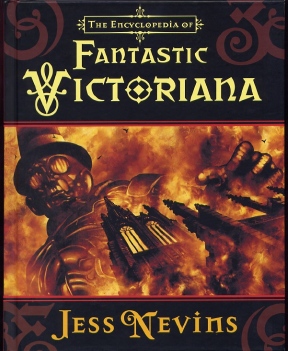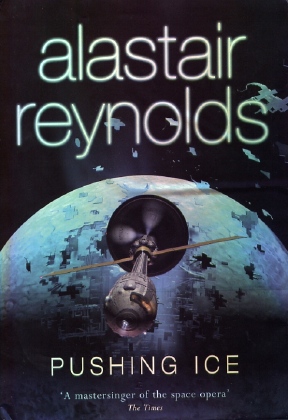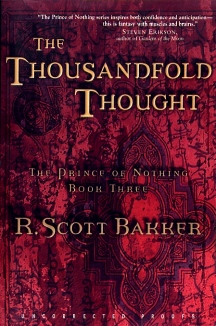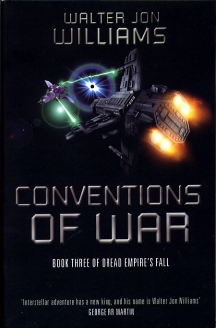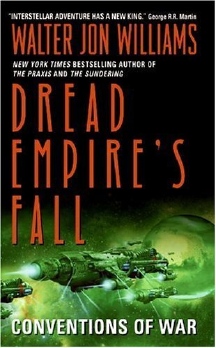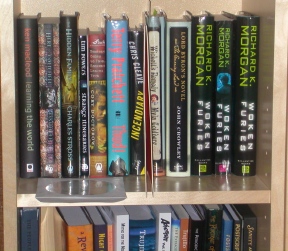|
|
|
This Just In...News from the Agony Column
|
11-11-05: 'The Encyclopedia of Fantastic Victoriana' from Jess Nevins |
|||
Literary
Connections
With over 1,000 pages, perhaps that's not a surprise. But there's more than a lot to love about this encyclopedia. There's a lot of great reading in here, of the kind that will delight readers and prove invaluable to writers. Look, if youre a writer who might ever need to know something about, well, Fantastic Victoriana, then you'd better pick this book up right away. I'm not sure how many copies theyre going to print of this, and it's so excitingly well done, you'll definitely want to make sure one is in your hands just about the time you ask yourself, say, "Well, what's the origin of the police procedural?" That answer popped up in the first few minutes that I browsed through this amazing book. The answer is "The Casebook", and Nevins lines up two and a half of these huge-format pages about this unknown-to-me literary subgenre. "...during the 1850's and 1860's the dominant form of mystery fiction was the "casebook" story. These stories originally appeared in magazines and then were published in collections known as "casebooks". The casebook mysteries can be thought of as precursors to modern police procedurals. The casebooks are partially or entirely fictional portrayals of police work, usually told in the first person, with a significant amount of accurate details of contemporary policing and a focus on realistic plots and characters." Now to me, this was a revelation. Literary mysteries in the 1850's focusing on accurate portrayals of police work and realistic plots and characters? But that's only the barest tip of the iceberg here. The book is extensively cross-referenced, and words in bold print can be looked up for further information. That's how I came across the entry on the casebook in the first place. And from there, you can go to Inspector Bucket, Dick Donovan, Tom Fox... And each of these offers more references. There are probably a two trillion ways you could read this book from cover the cover in a completely anarchic fashion skipping from one reference to the next. The writing here is universally excellent. Nevins really, really, really, really -- you can add the next two or three dozen lines of reallys yourself -- knows his stuff. (Presumably; if he's making this all up, it's the greatest work of fiction ever, bar none.) Nevins knows his stuff well enough to write lively interesting prose, and he keeps his articles at the correct length so that they can generally be easily read in one sitting. Of course, since anytime you pick up this book you'll be reading about two dozen articles, plan on that sitting being fairly lengthy. Be prepared! So, at fifty bucks, this is as pretty hefty price tag, and readers will rightly want to address the question whether this is the right book for them. To my mind, this has a very wide appeal. Any browse through the book will churn up dozens of literary-gem true short stories about literature. If you're simply a reader who reads mystery, science fiction or horror, you'll find yourself spending entire afternoons jumping about the book. It's pretty damn amazing how complex and interesting the history of the genres we love turns out to be, and that history is here in every single detail, in more detail than one might imagine possible. The bottom line is that if you read genre fiction, here is a book about genre fiction that reads like a work of genre fiction but isnt at all fictional, thus making it even more amazing. This is a total hoot, and it will enliven subsequent reading in a way that will make it even more valuable. For librarians, researchers, literary scholars and students of genre fiction, the book is irreplaceable. There's nothing you wont find in here with so many cross references that you'll be adding notes all night. And while I havent mentioned this yet, the book is beautifully laid out. The type is big and easy to read, and pages are white-white-white to make reading even easier. The boldface cross-references jump right out at you. And this book is packed; once you get past the title pages prepare to be assaulted by over one thousand solid pages of useful text. And finally, those most critical potential readers of this book are themselves the writers out there. Look, if you need inspiration, research, random bits of background weirdness or solid detailed information on the giants upon whose shoulder you stand, it is most definitely here, and it's here with so many links that you'll find that you have to winnow down what you want to use. Just about any writer of science fiction, fantasy, horror or mystery will find this the kind of book that never quite makes it back to the shelf, the kind of book that earns its place on the desk next to your dictionary. I must say that I'd pay the same amount -- or even more, maybe -- for a CD-ROM version. Or, perhaps, Monkeybrain could simply set up a membership website or something. All this cross-referencing is so HTML you can almost see the tags beneath the text. One of the reasons this book is so useful is that it's very expansive and inclusive. Now, I wouldn't necessarily expect to find the work of James Fenimore Cooper in a book about Victorian Fantastic Fiction. But in a random page-turn I came across the subject of "Proto Mysteries...a work of fiction, written before the advent of the modern mystery genre, which has the themes and motifs of mystery fiction." The next paragraph talks about making deductions and references Hawkeye. So, I look up Hawkeye and damn, if Nevins can be this entertaining when talking about the bane of high school literary reading, what can the man not do? "Cooper is prolix. He has the penny-a-word writer's inability to get to the point. His descriptions are circumlocutions. His declamatory, speechifying dialogue style lacks all verisimilitude. The story is plot-heavy and obsessed with violence. The characters have no internal life, and the only characterization comes through heavy-handed, obtrusive dialogue." Oh, come on, Jess, tell us what you really think! Nevins' candor is a refreshing blast of fresh air in an environment that certainly has the potential to be every bit as stuffy as its subjects. But Nevins merely studies those who wrote about the stuffy Victorians and generally went about unstuffing them, quite messily. He's not stuffy. He's smart, and not just smart enough to know how to find out all the stuff he no doubt had to find out to write this book. He's smart enough to pop out 1,000 pages of snappy commentary on books that for the most part, nobody who reads these days has ever heard of. It's like there's a world of books that you just didn't know existed. Now you can not only discover that they exist, you can read about them. I'm not sure where you'll have to go to get this book into your hands. I'm only sure that you should go there and make sure you have enough money to leave with the book, because, no matter how hard it is to pick up, once you do, you wont want to put it down. |
|
11-10-05: 'Pushing Ice' With Alastair Reynolds |
|||
Welcome
to Sensawunda
That's because Reynolds, for all his acclaim, for all his success, is a restless, driven writer. Not content to simply repeat his previous successes, or even build on them, Reynolds has been pushing his prose, his plots and his personae to places neither he nor they have been before. The paradoxical result is a novel that at least starts out much closer to our home and our time than any of his other work. Of course, things get weird in a hurry. As the novel begins, it's 2057 and the human race has finally begun the economic exploitation of space. It can't happen soon enough as far as I'm concerned. The fuel for this comes from comets, dragged back to Earth by mining ships; pushing ice, they call it. Here's where Reynolds lets his hard science fiction side roam free, with beautifully detailed ships and crews working in environments that brought me back to my Chesley Bonnestell days. Bonnestell collaborated with director George Pal and writer Robert A. Heinlein on the film Destination Moon, creating that now-nostalgic futuristic look. I remember standing in the Covina bookstore, right on the corner of the shopping circle, thumbing through the books that featured the writing of Willy Ley and the vivid space art of Chesley Bonnestell, thinking that right about now, those visions would be true. And it's not as if I was alone; after all, Arthur C. Clarke and Stanley Kubrick painted a similarly convincing portrait of the future in 2001: A Space Odyssey. And that's not a bad comparison for what unfurls in Reynolds' new novel as well. Remember the old title, 'Chasing Janus', that Reynolds decided to discard because it was the title of an episode of Starhunter? (No, I still wont confess to having watched that show in my sleep enough to know even who the character Janus was.) There's a reason that Reynolds thought this an appropriate title. Bella Lind is the captain of the Rockhopper, a comet-mining ship just waiting to come home. But some rather startling news puts the kibosh on that plan. One of the moons of Saturn, Janus, is leaving its orbit. It's leaving the solar system. Bits of it are falling away, and clearly, it was not the lifeless lump of rock and ice it was always thought to be. Rockhopper is the only ship that might be able to follow it. Leave cancelled, folks! What follows is no less than Thrilling Space Adventure, done one-hundred percent right. I had the privilege of reading an early draft of the novel, and I can assure my readers that Reynolds creates a detailed cast of characters, a fantastic environment, and offers Revelation and Redemption in ample measures. You'll get your dose of weird, all right. But you'll get it via gorgeously transparent writing and hard-nosed speculation from someone who knows a lot about the nuts and bolts of space travel. What's really on display here, however, is Reynolds' dedication to the craft of writing great prose and rock-solid, spine-tingling science fiction. Enigmatic alien artifacts, and even aliens get a boost not from weirdness but from a writer who is interested and involved in his craft. Reynolds is focused not just on the nuts and bolts of space science, but writing. He's consciously stripping away excess words to put the reader ever-more precisely into his visions without sacrificing the baroque excesses of his peculiar imagination. 'Pushing Ice' is something of a bridge book. That is, it starts out in territory familiar to most readers, not just the SF elite. Even those who don't ever read genre science fiction will understand what Reynolds is on about at the start of 'Pushing Ice'. This is the traditional crew-at-the-end-of-their-voyage scenario. Anyone can climb aboard. There's not a lot more science fiction there than in the current plans to send a man to Mars. Probably less. But once you're there, Reynolds will take you someplace you've never been. The transition is seamless. Each step follows the last in a perfectly logical fashion. But somewhere along the journey, your reading reality will shift. A little at first, then a lot. Readers of science fiction will recognize the pleasures Reynolds provides. We've got a name for it; the sense of wonder, or as it's often called, the "sensawunda". Like a great piece of music, 'Pushing Ice' starts out in well-wrought, firmly established territory and takes you someplace unexpected, and you, the reader, will never know exactly when it happened. Reynolds' smooth transition from near-future science fiction into visionary transcendence is the kind of voyage that may just bring in more than the science fiction-reading set. There's a lot of interest in space opera at the moment. It might seem to be a pretty specialized sub-genre, but the same was once true for the police procedural. At some point we passed without realizing, the police procedural became, well, the kind of book that any reader could enjoy. Now, I know many, probably most of my readers will pick up and enjoy 'Pushing Ice'. And yes, we've enjoyed our stint on the cutting edge. But the honeymoon may be over and the time may have come for science fiction readers to share space opera with a wider reading public. |
|
11-09-05: R. Scott Bakker's 'The Thousandfold Thought' |
|||
A
Fantasy Finishes
I remember back in 2003 when I got 'The Darkness That Comes Before: The Prince of Nothing Book, One', the first book in this series from Simon & Schuster in the UK. This publisher has a great track record for issuing meaty trade paperback originals by new and established authors. Now, while I wish that all the books they issue in these UKTPB originals were done in hardcover, I'm glad that if the economics dictate they must come out in TPB, at least S&S is doing a great job of packaging them. The finished books are superb examples of this format. So, there I am back in (late) 2003 and I get this very strange fantasy. It looks extremely...complicated. And it proves to be just that. But for my money the denser the novel, the more satisfying it is. A book that has you going, "What the hell is this all about?" early on, and eventually sort-of tells you -- while also letting you draw your own conclusions, is to my mind most satisfying. And what we had here was clearly a dense and original fantasy, the kind that ought to sell like hotcakes in the US, where fantasy rules. But as time went by, no US publisher appeared, until, FINALLY, Overlook Press took over. Overlook did two excellent things. First, they published their first edition of 'The Darkness That Comes Before' in a nice, study hardcover. Then, they actually published the sequel, 'The Warrior Prophet', in hardcover as well. Being sort-of a compulsive type, I waited for the UK version to come out from S&S...and waited. Until I found out they'd decided to pass on publishing them. I was surprised, but it was their loss. But as I had the first two in nice first-ed hardcovers, I wasn't too heartbroken, though I'd rather liked the trade paperback design. Overlook answered my unuttered prayer by issuing their trade paperbacks with the same design chosen by S&S, so that I could have two complete and matching sets of books. If and when the series finished. We all know about fantasy series that start and dont end in a timely manner. On one hand, there is, to euphemize, just more of them to love. And that's good. But it's even better, for me as a reader, when a writer pops out the books like clockwork and promptly finishes a series, as has Bakker with the release of 'The Thousandfold Thought'. And I have to say that Bakker has done an outstanding job here. Even though the proof I have is over 500 pages, 'The Thousandfold Thought' is a not a bloat-o-rama. The book is split into three sections. The first thirty-three pages are devoted to "What Has Come Before..." Now I know that some readers dont like these "scenes from last week's show," but for me, they're very helpful. I like being thoroughly immersed in a series, which is why I often wont start one until the final book is issued. That habit came from reading a series by Brian Stableford that started with 'The Werewolves of London' and concluded like five years later with a very difficult-to-find paperback 'The Carnival of Destruction'. So these reminders are nice, for this reader. And note that the "Scenes from..." pages are numbered I through xxxiii; the actual novel starts on Page 1, as it should. And for those who dont want or need a reminder of "What Has Come before", well, you can just skip it. You wont have to sit through unwieldy scenes in the beginning of the book where a character says, "You remember back when...?" So, after the scenes from last week's show, you get a good 403 pages of novel. For the concluding title in a trilogy, that's remarkably tight. Usually the trend is that books get longer as you go into the series, not shorter. 'The Thousandfold Thought' takes some twists and turns that readers wont expect, but it does answer the big questions posed. And that's also remarkable. But if the novel ends at page 403, how do you get a 500-plus-page book? Well the answer to that should be obvious given the details of Bakker's world, and you are given the details of Bakker's world, in a whopping 105-page "Encyclopedic Glossary". It's really an incredible feat; not that most fantasy writers dont do something like this when they create their worlds, but few bring it to the kind of polished form you can actually publish in order to enhance the reader's understanding and enjoyment of what theyve read. That of course leads to my whinge that they shoulda-oughta published dat dere Glossary at the end of the first volume, where it might have done more good. But of course, a big part of the enjoyment of reading such dense fiction is that you have to figure it out for yourself. Moreover, the definitions may themselves contain or in fact be spoilers, so I understand why they might not have done so. Still. Still. Reading a fantasy series like 'The Prince of Nothing' is sort of like visiting a foreign country where you dont exactly speak the language. It's immersive and rather alienating. But we readers of fantasy and science fiction enjoy being alienated by our reading. That's why we read it. If the real world feels alienating, then our fantasy worlds should as well. |
|
11-08-05: Walter Jon Williams 'Conventions of War' |
||||||
The
End of the Universe in High Style
Oh, if it were only that easy. When readers start a series these days, chances are they'll be exercising their patience as much as their imagination. So when a writer manages to write and get a series published in a fairly timely manner, then there's reason to celebrate, especially when the series is as good as Walter Jon Williams' 'Dread Empire's Fall'. Of course, it was three years ago that I read 'The Praxis', the first book in the series. What 'The Praxis' had going for it was everything that recent space opera has -- a detailed universe, great characters, vivid settings, great prose, and a plot arc that effortlessly combined both large scale and small-scale scenes. But it had one extra ingredient that you dont always find in this genre, and that was a literate sense of humor. In fact, in the best passages, it was reminiscent of the heights of British humor scaled by P. G. Wodehouse. Williams combined that sense of propriety with a sense of the absurd and delivered a novel that was thrilling, imaginative, filled with pulp adventure and yet subversively witty. It was great stuff from his then-publisher, the Earthlight Imprint from Simon & Schuster in the UK. They followed it up a year later with 'The Sundering', also from Earthlight. Darren Nash at Earthlight deserves a lot of credit for bringing out these novels in wonderful trade paperbacks, sturdy books that were nicely designed. Now, alas, Earthlight is no more, and perhaps that's why the final piece of the 'Dread Empire's Fall' series took two years. But it could also be because it is in fact a much heftier book, and Williams has been spinning some nice award-nominated stories over at SciFiction. Still, now that 'Conventions of War' (Simon & Schuster UK ; November 7, 2005 ; £10.99) is out, readers once again have reason to celebrate. That's because Williams has actually finished the trilogy and the story. With 677 trade paperback pages, he's given himself enough rope, er room to do so.
The setup for Williams' space opera is pretty delicious, and if youre looking for a avenue in to get an idea just what the new space opera is all about, 'Dread Empire's Fall' is a not a bad place to start, and that's not just because it's finished. Williams has penned a few *.* titles in his recent literary career, and one can very subtly feel the influences at work. There's just enough of the familiar in Williams universe so as to make readers who have never journeyed into the reaches of interstellar space feel at home. 'The Praxis' begins as the universe itself sort of ends, with the death of the final member of a species that had held an interstellar empire together with a combination of superior technology and brute force. No, the Shaa won't be missed, but the order that kept their empire together will be missed. The insect-like Naxids, freed from the tyranny of the Shaa are anxious to demonstrate to humanity their own form of tyranny, and one can imagine that it's not pretty. And as for humanity, well, we don't exactly play together particularly well when unsupervised. That's of course where the humor creeps in. Williams displays a humorous interest in many of the same things that Wodehouse was on about. Williams goes after class schisms, the arts, and the complicated relations between the sexes. Of course he does it against the backdrop of a crumbling galactic empire as opposed to the crumbled British empire, but to my mind, that's no problem. So long as you enjoy your wit served up with a side dish of starships and aliens, you can't really go wrong with 'Dread Empires' Fall'. And if you've already signed up, the long wait is over. It's time to watch the universe end -- in style. |
|
11-07-05: : A Conversation With Richard Morgan |
|||
"The
Haves Do Rather Well"
I had something of an agenda when I started the conversation, which Morgan quickly subverted. I was interested in how he used his novels to serve up his politics. But that wasn't really the case. Like most writers, to a certain extent Morgan is always looking for a ripping yarn. Yes, his novels are filled with politics, but he told me that the politics of his future are not so different from the politics of the present. His sleeve and stack technology -- a system whereby we can store our consciousness in the 'Altered Carbon' of a "cortical stack" and install the stack in a newly cloned and designed "sleeve" [that is, a cloned human body] -- is a perfect distillation of cyberpunk tropes, condensed and made nicely portable so that Morgan can engage in all sorts of nasty mystery as well as political shenanigans. "It's also going to make for a much more longer term, kind of dynastic approach to power, in the sense that, at the moment, let's face it, there's a certain amount of dynasty in the US today; you've got a man running the country whose father also ran the country, and whose brother looks like he might be running the country in the future." But when I asked Morgan why science fiction was his genre of choice to write about politics, he was quick to correct me. "I think that's possibly looking at it the wrong way round. It's not that I choose to write about political subjects and go looking for the genre to do it in, I've always loved science fiction, and so what I'm doing is writing science fiction novels with a kind of American crime noir bent to them." This is not to say he sees his novels as non-political. "The politics just comes in along the way, because inevitably, if you are writing about human life and human interaction, then you are writing about politics." I did catch Morgan a bit by surprise when I asked him about all the torture one finds in his novels. At first he was inclined to deny it, but when I started laying out the scenarios -- they certainly stand out in my brain as quite horrifically memorable -- he fessed up. "You got me bang to rights," he admitted. "It's a fair cop." When I asked him why he wrote about it, his first response was that, "There's always the possibility that it's just simple monkey curiosity, the sort of horrible trait that we carry with us all through evolution." But, "Torture horrifies me," he was quick to add. "It always has." To me that was quite piercingly clear, as the bits in the novel seemed like little horrific crescendos. But I was shocked to learn the source of his scenarios. "The other thing that's worth pointing out," he told me, "is pretty much all the torture that's in my books, I havent had to make up. I've read this in actual Amnesty International reports." I have to say that Morgan's politics are well, perhaps a bit higher up the decibel scale than one might think to find in what is usually seen as escapist fiction. Yes, Morgan does write a ripping yarn. But his latest ripping yarn, 'Woken Furies' seems both more virulently political and yet much calmer than the previous entries in his Takeshi Kovacs series. I asked him about the influence of Kem Nunn's 'Tapping the Source', which he cited in the credits for the novel. "The Kem Nunn book, Tapping the Source, it's a great novel...it's one of those ones where you open it on page one and realize how good this guy really is..." To my mind, he's really captured the powerful vibe of Nunn's novel and done himself a pretty damn good job of creating a feel of violence recollected in tranquility. There's a maturity in 'Woken Furies' that accompanies, the, uh fury that we've come to expect from Morgan. Morgan and I spoke for what trims down to 57 minutes with no edits on my part. I think readers will really enjoy Morgan's rap, and that's what it is; a signifying speech that's simultaneously utterly natural and flowing, yet filled with worthwhile thoughts and a fair amount of entertaining profanity. Should you be offended by basic seven-words profanity, you should be forewarned that you'll hear a selection of them in this interview. I disavow any responsibility should your head explode upon doing so. Readers looking for a ripping yarn should start with Morgan's 'Altered Carbon', follow up with 'Broken Angels' and finish up with 'Woken Furies'. Morgan doesn't have immediate plans to rolls out another Takeshi Kovacs novel. You'll still have his hilarious, ultra-violent and well-written corporate satire 'Market Forces' to read. He talked to me about his next novel, 'Black Man', set a mere 100 years in the future, which concerns genetic engineering. "I have had to do an awful lot of reading," he told me. "Initially just to get my head round the ideas of what genetic engineering will and wont be able to achieve...This is probably about as close to the wind as I've steered for a while...It's kind of reminded me why I enjoyed writing further future stuff." But Morgan's detailed writings are what make his work so powerful; his classic private-eye voice speaking in a well-thought out future that bears a remarkable resemblance to the present create powerful tension, deeply-seen and felt imagery and a thrill that brings reading alive. That's why he's rocketed to the forefront of the current crop of science fiction writers. His voice, be it in prose, MP3 or RealAudio is always crystal clear. This is your brain. This is your brain in Altered Carbon, being ripped out the back of your neck and sleeved in a new body. If you can afford it. |
